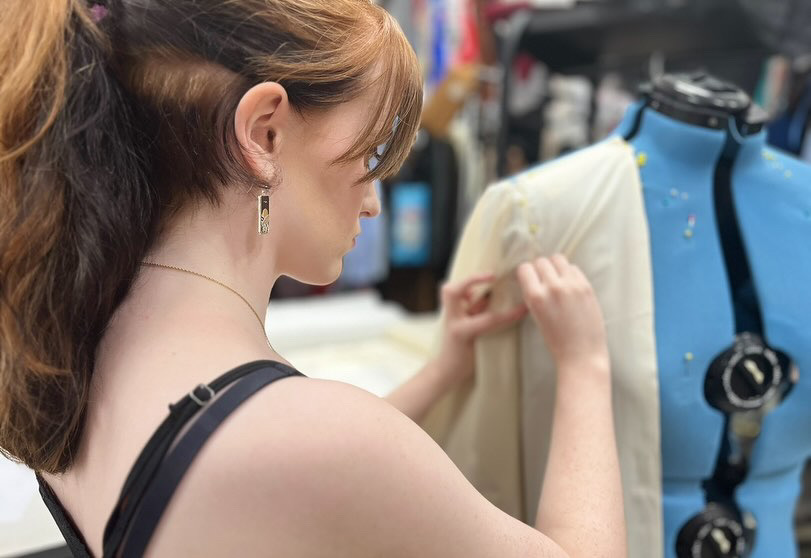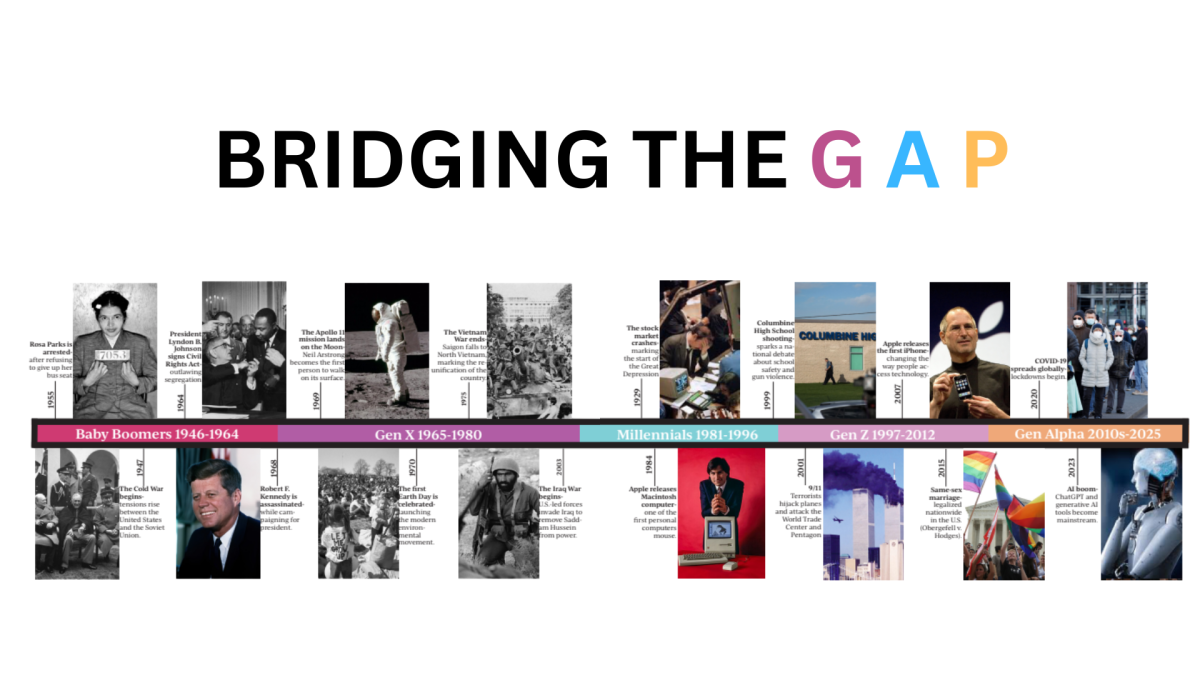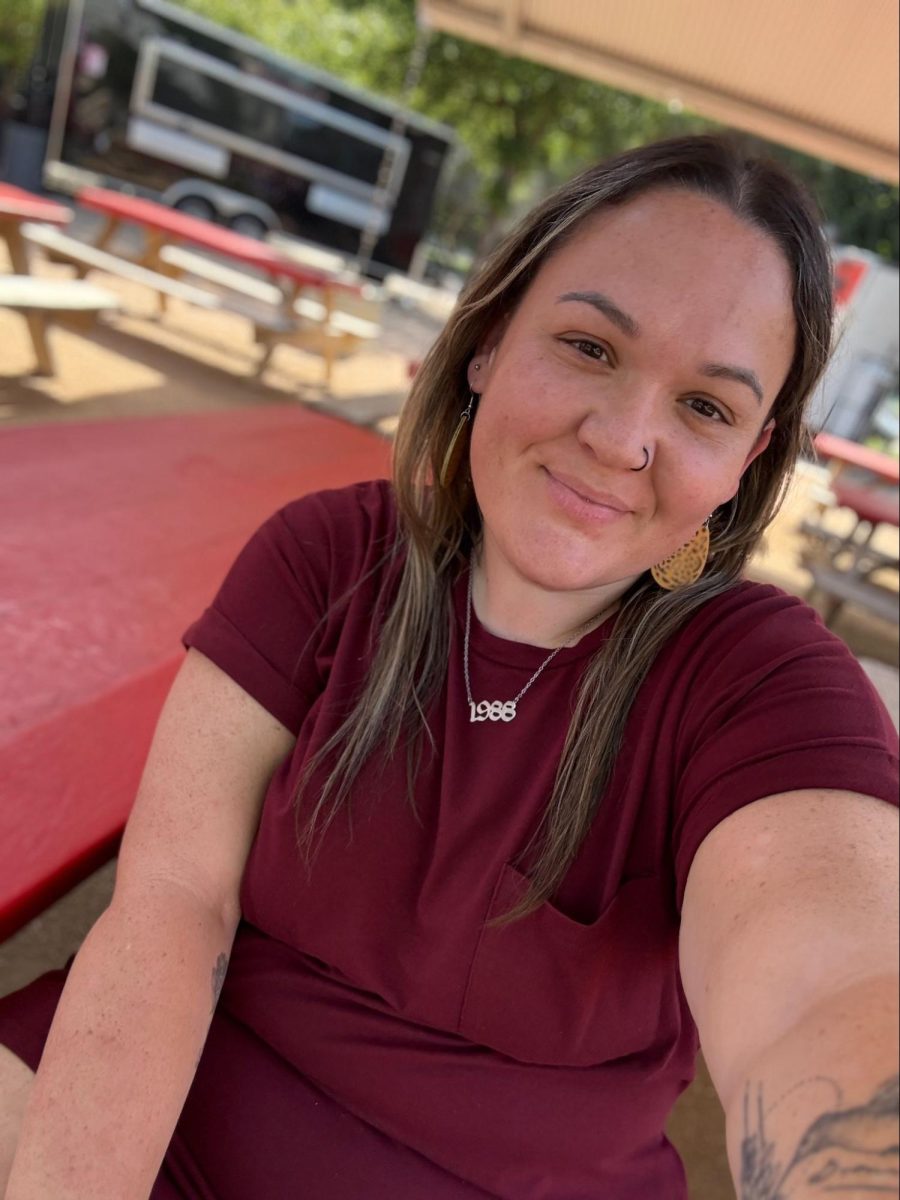The theater department’s costume class is in limbo after years of constant changes to the curriculum, and it’s beginning to reach a breaking point. This school year, the class roster size is so small that the only period collapsed under a tech theater class. With only eight students and no dedicated teacher, the costume department is being kept together by a small group of committed students.
During this period of uncertainty, junior Rylee Montgomery established herself as the unofficial head of the costume department. On top of taking on this leadership role, she also served as Costume Head on MavTheatre’s October production of “Little Shop of Horrors.”
“I think I’ve always had a knack for [costumes], I’ve always loved fashion history and whatnot,” Montgomery said. “It was relatively easy for me to just have an idea and do it.”
“Little Shop of Horrors” is the first time Montgomery went through the entire creative process of sketching costumes, picking fabric and sewing from hand.
“I’ve never actually designed something until this year,” Montgomery said. “Before this show, I had never fully sewn anything like a full outfit.”
Montgomery’s fascination with costuming did not start with her involvement in the course. It began when her mother noticed that she needed more to keep her occupied.
“At some point, my mom realized that my ADHD was running rampant and I needed to have more art supplies to deal with,” Montgomery said. “She pulled me and my brothers and taught us how to hand sew.”
Carrying the weight of an entire subdivision of MavTheatre on her shoulders, Montgomery has had trouble finding the balance between teaching a class, leading a production and keeping up with her grades.
“It’s a lot of nights where I’m staying up and my eyes are going sore because I’m sewing, or me spraining my hand because I’m having to carry armloads of clothing,” Montgomery said. “People definitely don’t take it seriously, and it’s extremely frustrating.”
Montgomery feels that her team’s efforts tend to go unnoticed. As costumers, they typically stay backstage to make sure there’s not any wardrobe malfunctions or last-minute changes that need to be made, only to be recognized at the end of a performance with the little fanfare the audience has left to give.
“We don’t work with the big, shiny power tools and we aren’t in the spotlight singing and belting our hearts out,” Montgomery said. “A lot of people take us for granted.”
Montgomery believes that respecting the behind-the-stage crew is just as important as respecting fellow actors on-stage.
“There are a lot of people new to our program, and a lot of them are learning,” Montgomery said. “And it is a huge learning curve to understand that you need to respect your techies and your costumers.”
The costume crew doesn’t just plan out and make the clothes, but are also responsible for taking care of them and making sure they are treated correctly. The costume closet (the dedicated space for costume storage and construction in the N-wing) has a washing machine and dryer, but hand washing is also done for the clothes that require it. Clothing items that need to be cleaned are separated into sections of machine washing and hand washing based on what the clothing tag says.
“Lots of times where at the end of a show, my team and I are the ones that have to launder all of their clothing,” Montgomery said. “The smell of clothing at the end of a show, and the smell of dressing rooms is so horrendous, and a lot of people don’t understand that this is literally work a parent would be expected to do for their children.”
Though Montgomery jokingly calls herself a “Stage Mom,” because she ensures the cast and crew are hydrated and fed during rehearsal or run-throughs, that title often blurs the line between humor and reality.
“It’s really frustrating that we’re having to deal with that because we’re not their parents,” Montgomery said. “We should not be cleaning up after them.”
Montgomery has a handful of students with experience sewing that help her guide projects and teach their fellow classmates about costume construction.
“There’s only a few of us that know how to sew machine,” Montgomery said. “And not having the ability to teach them, or the time to teach them, with the stress of the show, really led to a lot of hindrances. When you have such a small group, everybody’s going to be asking one person who’s knowledgeable on everything.”
Following a year of the curriculum being taught by head theater director Gina Hinojosa, with a junior still finding her footing has spawned some unconventional problems.
“It’s caused issues in the fact that I’m not a teacher,” Montgomery said. “I’ve not gotten my degree in this, so I’m kind of wearing glasses leading the blind.”
It hasn’t been a completely solo effort by her, as theater teachers Hinojosa and Joel David Taylor have done what they can to help with the class. Even with Montgomery’s inexperience in leading a class, fellow students find it creates a more interesting dynamic for the group.
“I think it’s easier working with Rylee because we know that she’s in charge, and we can come to her for help, but at the same time it’s a different relationship,” Junior Quinn Villarreal said. “It’s professional because we still get stuff done. It’s just easier talking to someone closer to our age and she kind of is like a teacher in a way.”
The small class size directly impacted “Little Shop of Horrors” simply because the costume crew didn’t have enough bodies for their ideas.
“We only had eight weeks for the musical and for the ambition that I had,” Montgomery said. “There [were] a lot of things that we had to sadly cut towards the end. I think [if] we had more people, it would have been so much easier.”
After working extensively on MavTheatre’s production of “Little Shop of Horrors”, Montgomery took a short break from theater by taking a minimal role in A Christmas Story.
“Nothing anybody was wearing was hand-done because the show didn’t have a lot of time,” Montgomery said. “We came back from Thanksgiving break and then immediately started on preparations.”
After the winter show, the theatre department starts work on the UIL one-act play for the spring semester.
“I’m just nervous about having the time to build a well structured garment, and also if it looks bad, that’s not me competing.” Montgomery said. “It’s other people competing, and I don’t want them to look bad.”
With only eight people in the class, there have been efforts to recruit underclassmen. Since it’s an advanced course, it requires at least one year of theater experience before joining.
“I want some of my friends that are freshmen or sophomores to do it, because it’s just really fun,” junior Fiana McKillop said. “I’ve had a great experience this year with theater overall, and I want more people to do it because I joined it kind of late.”
Montgomery referred to the downtime between the winter show and UIL as “the calm before the storm”, because right after work on the UIL show is done, student one-act productions (SOAPs) start the casting process.
“I’m planning on doing Alice Through the Looking Glass, my co-director and I have discussed not building costumes from scratch, but instead upcycling some outfits.” Montgomery said. “I’ve offered to help other directors with their shows. We will do as much as we can, but I don’t foresee us doing more than laundry or selecting clothing, because it is very time consuming.”
During this time of quiet and lack of ongoing productions, costume lent out some of their wardrobe to Unified Champions for their recent prom.
“The most respected I’ve been is doing unified prom because they’re always really nice.” Montgomery said. “The costume team is kind of the easiest people to get donations from, because our closet is huge and we have tons of dresses and suits.”
Montgomery has faith that this period of uncertainty will come to an end soon enough.
“A lot of the interest that we’re seeing is from freshmen, and I definitely think that there’s a much higher chance this next year of it being a class than there was this past year,” Montgomery said. “So many more people are genuinely interested, and we aren’t losing half of our department because the seniors aren’t a large fraction of our group.”





















